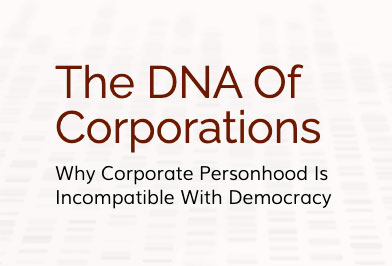“Corporations are people, my friend” declared Mitt Romney during his 2012 presidential campaign. And so they are in the eyes of the law today. Supreme and other court decisions going back over a century support this principle. We take it for granted.
This is a switch from our beginnings. The Founders left the governance of corporations up to individual states. The Federal constitution says nothing of corps, but early state constitutions tightly regulated their behavior.
Corporations could be dissolved by the state legislature if they broke the rules, or if legislators just decided they were not serving the community. At the time, corps were not regarded as “people”, and the “due process” afforded real people was not available to them. If a legislator were having a bad day, he could take it out on an unfortunate business. Capital punishment for corporations was a thing.
Capital punishment for corporations should still be a thing, although its casual deployment should probably replaced with something more deliberate. Corporations will get due process, but the process for them doesn’t have to be the same as that for us humans.
Efforts by corporations to acquire rights continued during most of the 19th century, and continued into the 20th. Their efforts to acquire the rights enjoyed by ordinary human citizens were largely successful.
Armed with said rights, hordes of lawyers and lobbyists, and unlimited cash, corporations get away with all kinds of misbehavior. We observe the disinformation on Facebook, abandoned mines, oil wells leaking methane and toxic goo, failing electrical grids, the perilous temporary containment of nuclear waste, and plastic everywhere its not supposed to be. We don’t like any of it, but we can’t figure out how to fix it.
Facebook Founder Mark Zuckerberg takes his place among other corporate executives. He is not an outlier. He’s just another CEO doing his job.
During 2018 testimony Senator Orrin Hatch asked Mr. Z, “So, how do you sustain a business model in which users don’t pay for your service?”
He replied “Senator, we run ads”.
Some onlookers thought they observed a smirk in Mr. Z’s reply. My impression is that he tried to suppress the smirk, but was not entirely successful.
They do run ads. They are the source of 98% of Facebook’s revenue. Therefore, the company needs eyeballs. Lots of them. They would like to have as many people as possible spending as much time as possible staring at the screen, scrolling and clicking. As ads are displayed and viewed, money accumulates. Whether this is healthy behavior for humans, young or old, or for society overall is not part of the calculation since the company is not liable for any unfortunate consequences.
To attract viewers, Facebook needs “content”. New material keeps people engaged, so it must be constantly refreshed. Cat video producers are impressively creative, and they are definitely a source of revenue as users mindlessly click on the next one.
But far better is demonizing various racial / ethnic groups, blaming them for, well, everything, and propagating unlikely conspiracy theories thus producing rage, indignation and frenzied non-stop clicking. This is the heroin of internet content and the holy grail for social media platforms.
Not surprising therefore that Mr. Z says people should decide the truth of what they are viewing, not tech companies. Convenient and lucrative. Other CEOs might criticize Facebooks behavior, but when questioned about policies that might affect their own companies, they can be counted on the take the position that is most profitable for them. Mr. Z mixes effortlessly with the crowd.
